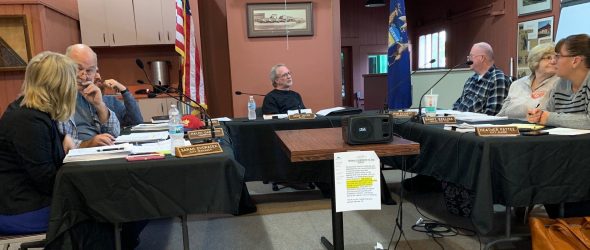Evart city officials seek acquisition of township property
-

The Evart city council is working to acquire property belonging to the township for the purpose of economic development. The two entities are in discussions about implementing a 425 agreement that allows the city to take jurisdiction of the property in question. (Herald Review file photo)
The Evart city council is working to acquire property belonging to the township for the purpose of economic development. The two entities are in discussions about implementing a 425 agreement that allows the
The Evart city council is working to acquire property belonging to the township for the purpose of economic development. The two entities are in discussions about implementing a 425 agreement that allows the city to take jurisdiction of the property in question. (Herald Review file photo)
The Evart city council is working to acquire property belonging to the township for the purpose of economic development. The two entities are in discussions about implementing a 425 agreement that allows the
EVART — Evart city and township officials continue to iron out the details concerning jurisdiction over township property for the purpose of economic development.
Evart Industrial Properties approached the city about annexing some property in the industrial park for the expansion of a current marijuana grow facility located there, according to Evart City Manager Sarah Dvoracek.
Since the property is currently part of Evart Township, and not under the jurisdiction of the city of Evart, annexation of the property would be necessary for the facility to expand, Dvoracek told the council at a recent meeting.
Evart Township Supervisor Doug Derscheid said he was concerned about the proposal of annexation because Evart Township voted to prohibit any marijuana facilities in the township, and the arrangement felt to him like an “end around what we thought was the desire of our constituents.”
On May 28, the Evart City Council and the Evart Township Board of Trustees held a joint meeting to further discuss possible options for transferring jurisdiction of the property in question from the township to the city.
Attorney Jessica Woods told the group there are two possible options they could consider — annexation and a 425 agreement.
“Annexation would require the mutual consent between the parties,” Woods said. “The city would need to pass a resolution to annex the property, and the township would have to consent, passing a resolution to allow the annexation.”
Without mutual consent, the annexation petition would need to be filed by the city to the State Board of Boundaries, she said.
“That would be a much more involved process, and would take much longer,” she added.
A 425 agreement allows units of government to conditionally transfer municipal jurisdiction over property from one municipality to another for the purposes of economic development, Woods said.
“The nice thing about the 425 agreement is that it is not an all-or-nothing proposition,” she continued. “It involves negotiation between the two adjacent municipalities. They can negotiate which ordinances would apply, how the tax revenue would be shared and who would be responsible for enforcement.”
“Annexation would be permanent, and there is really no negotiation of terms,” she added.
During the implementation of the 425 agreement, you cannot annex the property to which the agreement applies, but you can include in the agreement what will happen to the property once the 425 agreement terminates, Woods said.
“You could agree that the property would default to the city, or that it would default back to the township,” Woods said. “That would be part of the negotiations.”
Derscheid said the reason for his concern regarding transfer of the property is that the township board had previously voted not to allow medical or recreational marijuana facilities within the township limits, and by agreeing with this, they are changing their stance on the issue.
“That was our choice as a board, so we are wrestling with the idea that parcels from our township are now entering into an agreement that would basically go against what we voted for,” Derscheid said.
“In order to change this, and allow a marijuana facility within the township, would we have to go back and vote again and change our vote to permit it?” he asked.
Attorney Eric Williams told the board it would not be necessary for the township to change their ordinance prohibiting such facilities.
“You would not have to go back and change your vote,” Williams said. “The 425 agreement would state that those particular parcels would be in the city of Evart for the purpose of ordinance regulations and not in Evart Township. That would effectively remove that territory from township regulations and the decision not to allow marijuana facilities.
“That may not make it any easier to swallow, but it would not require the township board to change its stance on prohibiting marijuana,” he added.
Williams said he would like the township board to have some information on the economic impact of the development before making their decision.
“We would like to see how many jobs the expansion might create, the cost of the development to the city, the expected increase in the tax base and what the overall pan for the company is,” Williams said.
Another issue discussed is the impact the expansion will have on the rails to trails that currently separates the boundary lines between the township and the city.
Evart Assistant City Manager Mark Wilson said part of the trail would need to be moved.
“The property the trail is on is currently owned by the city, and the DNR has a right of way,” Wilson said. “We have discussed options for moving the trail and the DNR is open to those options. The proposed relocation keeps the trail primarily within the road right of way.”
Both parties stated more information was needed to make a decision and agreed to meet again for further discussions.


